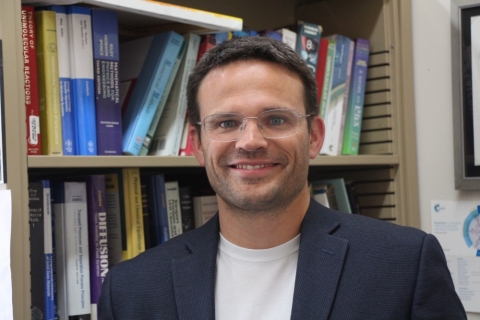
Date:
Location:
Speaker:
ABSTRACT:
Several industrially important catalysts for olefin polymerization, metathesis, and epoxidation are atomically dispersed metal centers on amorphous supports, e.g. the Phillips ethylene polymerization catalyst, Cr/SiO2). These heterogeneous catalysts elude the usual experimental and theoretical analyses because every site on an amorphous catalyst is different. Moreover, the disorder is “quenched” unlike the predictable dynamical disorder of a liquid environment. We will investigate the mysterious ethylene-induced initiation in the Phillips catalyst at molecular and catalyst pellet scales. At the molecular scale, we show how prevalent bis(ethylene)Cr(II) complexes can generate active Cr(III)-alkyl sites via a new tethered homolysis mechanism. The computationally predicted initiation times and fractions of active sites compare well to experimental estimates. At the pellet scale, the porous support pulverizes itself upon initiation and the Cr/SiO2 catalyst becomes diluted in an expanding sphere of polyethylene. Catalyst dilution leads to an effectiveness factor that increases with size of the expanding polyethylene/catalyst spheres. Thus, the observed activity increases with polymerization time may, in part, be due to early transport limitations. Finally, we present a new “Importance Learning” algorithm that combines machine learning and importance sampling methods to properly and efficiently average over the site disorder in ab initio studies of these catalysts.
BIO:
Baron Peters (from Moberly, Missouri, 1976 - ) is Professor of Chemical Engineering with a joint appointment in Chemistry and Biochemistry at the University of California, Santa Barbara. He completed B.S. degrees in Chemical Engineering and Mathematics at the University of Missouri – Columbia. He studied catalysis and reaction rate theory for a PhD with Alex Bell and Arup Chakraborty at the University of California, Berkeley in 2004. He did post-doctoral research with Bernhardt Trout at the Massachusetts Institute of Technology and with Berend Smit at the Centre Europeen de Calcul Atomique et Moleculaire (CECAM). Baron has contributed several leading computational methods and theories in the areas of reaction rate theory, heterogeneous catalysis, and nucleation kinetics. Baron also authored “Reaction Rate Theory and Rare Events”, the first comprehensive textbook on reaction rate theories and rare events methods.



